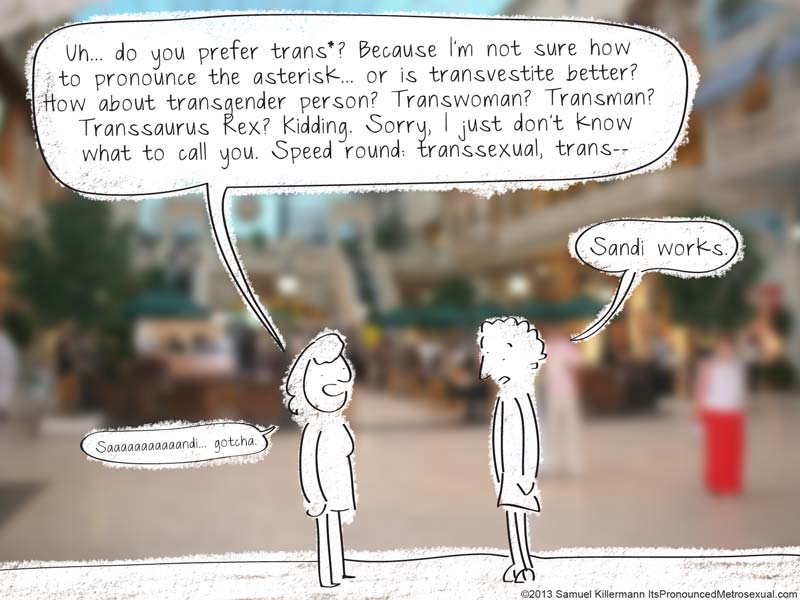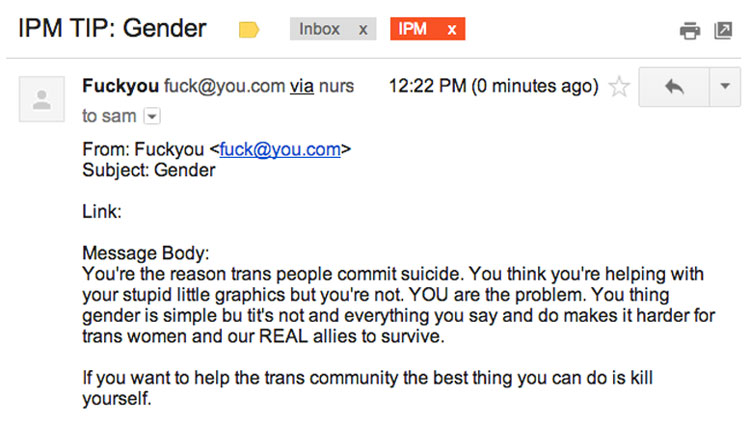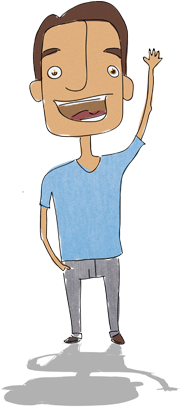I’m an ally. I’ve written before why I’m an ally, and I’ve even once defended my allyship publicly, highlighting many of my privileged identities. But one thing I’ve never fully addressed is the double-edged-sword, Kobayashi-Maru-no-win scenario that _can be _what it means to be an ally like me.
I haven’t focused on this because I don’t want to scare anybody off. Allyship is a necessary ingredient in the social change gumbo: the heat. The more we have, the faster things will cook, and the sooner we can all be sittin’ barefoot in my backyard slurping down delicious equity! Dang, I need a backyard.
om-jerry” width="700” height="500” data-srcset=”/wp-content/uploads/2013/05/hatemail-from-jerry.jpg 700w, /wp-content/uploads/2013/05/hatemail-from-jerry-300x214.jpg 300w” sizes=”(max-width: 700px) 100vw, 700px” />]2
Doing advocacy work will inevitably lead to you facing a lot of rocks in your life. These rocks are people who don’t believe in the equity you’re trying to achieve, and do whatever they can to stand in the way. The misguided expression “sticks and stones may break your bones, but words will never hurt me” comes to mind here a lot, because the sticks and stones _are _words, and they absolutely can hurt you.
And they will hurt you.
Because the stones are often being thrown by bigger “rocks” in your life: your family, your friends, your religious institutions, your community leaders, media, and anyone else who tells you queer is evil, and supporting queerness is evil. In the case of the email above, Jerry is a rock. And Jerry threw a piece of his rock at me. I get literally tens of thousands of rocks like Jerry’s thrown at me as a result of this site (most don’t use such proper grammar, though, so that bit was refreshing).
Rocks are relatively easy to deflect. I set up a lot of filters on my gmail to redirect rocks into a quarantine folder (e.g., I added a filter after Jerry’s email to catch the phrase “mixed gender mutt” because that was new). I don’t often open that folder. Rocks are also relatively easy to ignore. After you’ve heard it all enough, rocks become pebbles and pebbles become sand. You learn to expect the horribleness you’ll hear/read, and let it blow over you.
Rocks are also expected. Most allies sign up for duty knowing they are going to face rocks. We’re allies because we need to move those rocks, because we’ve seen how damaging they can be, and we want to get them out of other people’s ways (politely, through education — not with a catapult, like how I am sometimes tempted).
It’s the hard place that might come as more of a shock.
The Hard Place
The hard place of being an ally is the backlash you may experience from members of the groups you’re fighting alongside of_. _This is incredibly difficult to stomach for more reasons than I’ll recount here, but it all boils down to a big portion of double-rejection stew. People opposed to queerness are whipping carrots at you because you’re a non-queer person supporting queerness, and people who are queer are whipping potatoes at you because you’re a non-queer person supporting queerness, and you’re left with a pile of carrots and potatoes and sadness.
Silly metaphors aside, it’s incredibly difficult to feel attacked by the people you are trying to fight alongside of_. _It’s a far worse feeling than when you hear from people like Jerry, because unlike Jerry, you expect the people for whom you are advocating to be on your side. When they aren’t, and when they lash out, it feels like being betrayed.
The person above, *ahem* Fuckyou (if that is her real name, which I doubt!), is one of the many trans* people who have publicly stated that I (and, in most cases, cis-people in general) should stay out of the fight for trans* rights. Well, that’s the spirit of what she said, anyway. I’ve received similar “discouragement” from several gay, lesbian, bisexual, pansexual and other queer people.
Why the hard place?
Because this world is a hard place. To put it bluntly, many queer folks are taught not to trust folks who aren’t queer. For every well-intentioned ally there are several louder, terrifying, and destructive queerphobic people. And there is also a sentiment that some self-labeled allies have ulterior motives (e.g., trans* fetishes, status-seeking), leading to more concern and untrustworthiness. There is all that and more behind this, and every person you talk to will have a different narrative and perspective, but this all goes to say that there is a lot of justification for hard-placing.
But understanding the unfortunate origins of the sentiment doesn’t make it any easier to stomach.
Emails like the one above tear me apart. I get Google alerts whenever my name, the name of this site, or the non-profit I run pop up on the web, and many times reading those discussions is equally heart-heavy, when I see conversations of this theme popping up. And making things potentially harder on myself, unlike the emails from the “rocks” out there, I read as many of these messages as I can — the emails, the forums, the tweets — because I hope to learn from them, and be a better ally as a result.
The long and short of it: if you’re an ally for a marginalized group of which you aren’t a member, odds are you’re going to face resistance from some individual members of that group (e.g., I am a trans* ally, but as a cisgender man I’ve experienced backlash from trans* folks). Now you know.
When there’s a rock on your left and a hard place on your right, move forward
Navigating rocks and hard places and trying to make everyone happy all the time is only going to ensure that you are unhappy all of the time, and that’s not good. To quote Mitch Hedberg, “You can’t please all the people all the time… and last night, all those people were at my show.” Occasionally, you may feel like this joke is your mantra.
But most of the time it’s not that bad.
Most of the time you can realize that there are rocks and there are hard places and there is also a third thing: a path forward, between the two, that leads to the progress you’re dedicated to advance. The Kobayashi Maru was an unbeatable challenge until Kirk changed the terms (or, in the 2009 film, ate an apple like a cheating jerk) to make it beatable. If instead of focusing on the rocks and hard places, we focus on taking step after step, moving forward slowly, the impossibility fades away.
And you can always fall back on your reasons for allyship as a guiding compass.
Are you an ally because you want all people (straight/cis and queer) to like you? I hope not. Are you an ally because you want all people (straight/cis and queer) to experience to a world that is equitable and socially just. I hope so. Focus on that. Haters, they gonna hate. Ballers, they gonna ball. Shot callers, they gonna call. That ain’t got nothing to do with me and you. That’s the way it is. That’s the way it iiiissss.
But wouldn’t it be better if more folks were encouraging of allies?
Yes, it absolutely would be. I know an unfortunate number of people (a veritable shit-ton) who aren’t allies because they’re afraid. This goes for straight/cis people being allies to queer people, and cis-gays/lesbians being allies to trans* people.
But it’s a dangerous line of thought to think that it’s the oppressed group’s responsibility to make things more comfortable for the oppressors. So while it would be better, it’s not something that should be a necessary condition for someone considering allyship.
Everyone has their own story. If a specific person doesn’t want you being their ally because their story is one in which you being an ally is a bad thing, don’t be an ally to that person. Focus on the people who are open to your allyship instead. Engage with them, ask questions, learn, be open-minded, and keep moving forward.
Are most queer people ally-friendly?
I get asked this a lot, and, to be honest, I’m not sure (anyone know of reliable, generalizable research on this question?). What I do know with absolute certainty: the answer doesn’t matter. We can move on without knowing the answer to this question for two reasons:
One, I know a ton of queer people who are super ally friendly. So if you are trying to learn more about how to be a good ally, to understand the issues and perspectives, and have quality, safe conversations, these people are there. Just shout. They’re online, they’re in your town, they’re climbing in your windows, snatching your people — sorry, different they. Where was I? Oh, two. 2.
Too, if you’re allying, you’re going to spend most of your ally time allying with people who aren’t queer anyhow. That’s, you know, kind of the point. If it makes you feel cooler, think of yourself as Batman, allying in the shadows, looking for no thanks other than the satisfaction of cleaning up a city with a dark underbelly and an impressively ineffective criminal justice system. Focus on the rocks, not the hard places.
Do you need thanks or permission to ally?
The more public you are about your allyship, the more likely you will have some positive experiences you can use as fuel to keep moving forward. For me, an example of this is thank you emails I get from trans* people who tell me stories about using the Genderbread Person to explain their gender when they were coming out to their families. And even if you don’t have anything that tangible, know that the vast majority of queer people I interact with cherish the allies in their lives, even if they don’t often express this verbally.
And you can watch this video that was shared with me that addresses the particular rock and hard place I was in the last couple weeks, and consider it all the permission you need:
People helping people: it’s a beautiful thing
That’s allyship at its most simple. Please use the comments section below to discuss other set-backs and issues allies might face, ways allies can be better allies, and the unethical misrepresentation of Kirk in Abrams’ 2009 Star Trek.
But mostly the first two, maybe?



